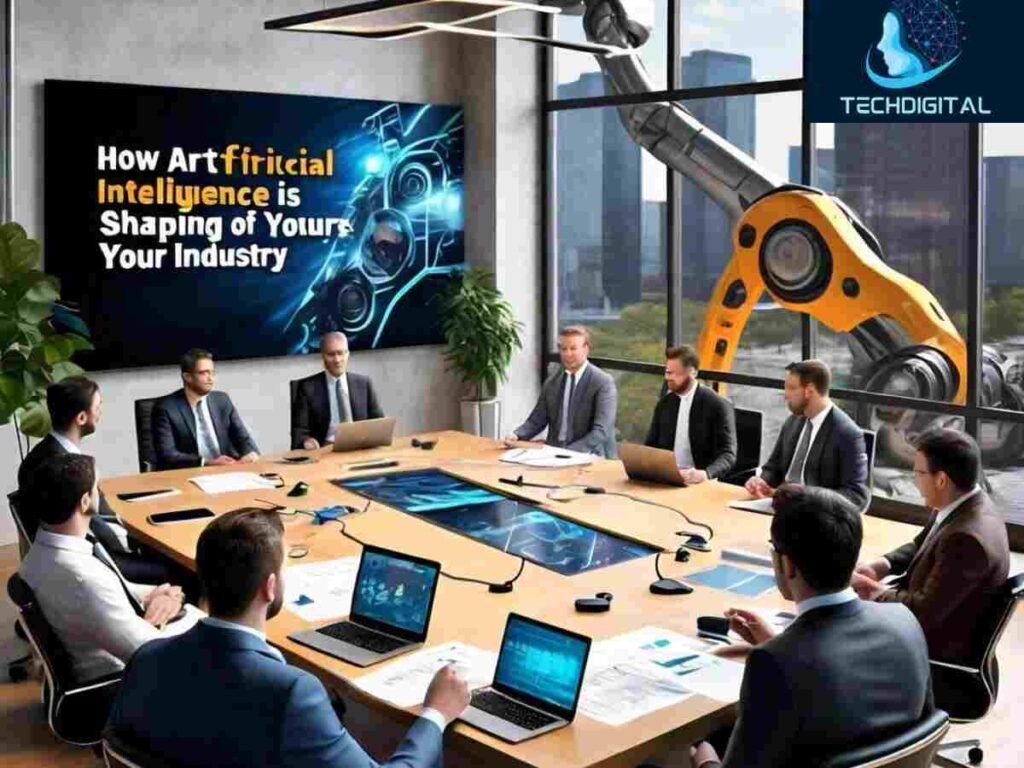Table of Contents
ToggleArtificial Intelligence
Artificial Intelligence (AI) is revolutionizing industries by offering unprecedented efficiency, enhanced capabilities, and innovative solutions to age-old problems. From manufacturing to finance, AI’s influence is pervasive, pushing boundaries and setting new standards. This comprehensive exploration discusses how AI is reshaping various sectors and what this means for the future.
Evolution of AI
- AI has come a long way from its theoretical roots in the mid-20th century to becoming a cornerstone of modern technological advancement. Its evolution is marked by significant milestones from simple neural networks to sophisticated machine learning and deep learning algorithms that mimic human cognitive functions.
Artificial Intelligence in Manufacturing
Smart Automation
- Automation powered by AI is not just about robots performing repetitive tasks; it’s about integrating intelligence to manage complex operations, adapt to changing environments, and enhance production efficiency. AI systems are equipped to analyze real-time data, make decisions, and learn from their actions, leading to smarter and more adaptive manufacturing processes.
Predictive Maintenance
- AI excels in predictive maintenance, utilizing data from machine sensors to predict failures before they occur. This proactive approach saves costs and time, minimizes downtime, and extends the lifespan of equipment.
Supply Chain Optimization
- AI’s ability to analyze vast amounts of data helps in optimizing supply chain logistics. From predicting demand and managing inventory to optimizing delivery routes, AI enhances the entire supply chain network’s efficiency and responsiveness.

Artificial Intelligence in Healthcare
Diagnostics
- AI’s impact on healthcare diagnostics is profound. AI algorithms can process and analyze medical images faster and with greater accuracy than traditional methods, aiding in early and accurate diagnosis of diseases such as cancer.
Personalized Medicine
- AI is at the forefront of personalized medicine, where treatments are tailored to individual patients based on their genetic makeup, lifestyle, and clinical history. AI algorithms help in identifying the best treatment options, leading to better patient outcomes.
Robotic Surgeries
- AI-driven robots assist surgeons in performing precise and minimally invasive surgeries. These robotic systems can operate with precision that enhances surgical outcomes and reduces recovery times.
AI in Retail
Customer Experience
- In retail, AI enhances the customer experience by personalizing interactions and offering tailored recommendations. AI analyzes customer data to understand preferences and predict future buying behaviors, creating a more engaging and satisfying shopping experience.
Inventory and Supply Chain
- AI optimizes retail operations by managing inventory and logistics. It predicts product demand, manages stock levels, and plans efficient delivery routes, reducing costs and improving service delivery.
Marketing and Sales
- AI transforms marketing efforts by analyzing consumer behavior and optimizing marketing strategies. AI tools enable targeted advertising, content personalization, and sales forecasting, leading to increased sales and customer retention.
Artificial Intelligence in Financial Services
Algorithmic Trading
- In financial markets, AI conducts high-frequency trading by analyzing vast datasets to execute trades at optimal times, maximizing profits and reducing risks.
Fraud Detection
- AI systems detect unusual patterns that may indicate fraudulent activities. By learning from historical data, AI improves its accuracy in detecting and preventing fraud, securing financial transactions.
Customer Support
- AI-powered chatbots provide 24/7 customer support, handling inquiries and resolving issues faster than human agents, enhancing customer satisfaction and reducing operational costs.
Artificial Intelligence in Education
Personalized Learning

- AI tailors educational content to meet individual student needs, adapting to their learning pace and style. This personalized approach helps improve learning outcomes and student engagement.
Automation of Administrative Tasks
- AI automates routine administrative tasks in educational institutions, allowing educators to focus more on teaching and less on paperwork. Artificial Intelligence
Ethical and Social Implications
- While AI offers numerous benefits, it also raises ethical concerns such as privacy, surveillance, and the potential for bias. Ensuring that AI is developed and deployed responsibly is crucial to realizing its full potential without infringing on individual rights.
The Future of Artificial Intelligence
- The future of AI is promising, with ongoing advancements likely to introduce more sophisticated applications. AI is expected to become more autonomous, context-aware, and capable of making decisions in complex scenarios, further transforming industries.
Conclusion
Artificial Intelligence role in shaping the future of various industries is undeniable. As AI continues to evolve, its integration across sectors will only deepen, heralding a new era of innovation and efficiency. Embracing AI is essential for any industry aiming to thrive in the digital age.
Open this link: tap to here














